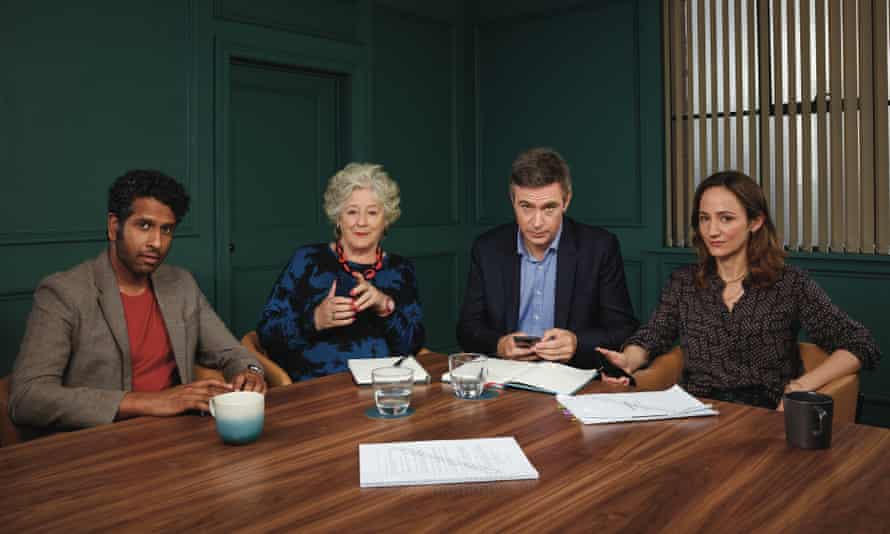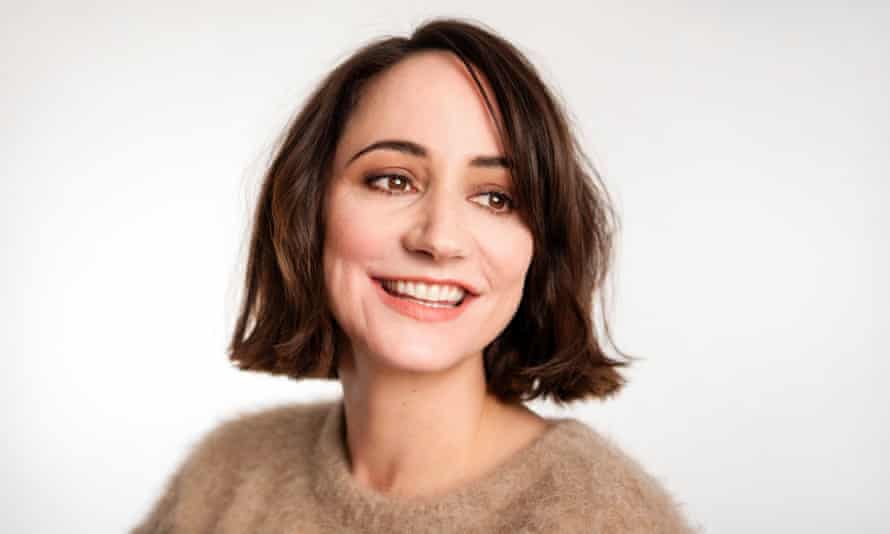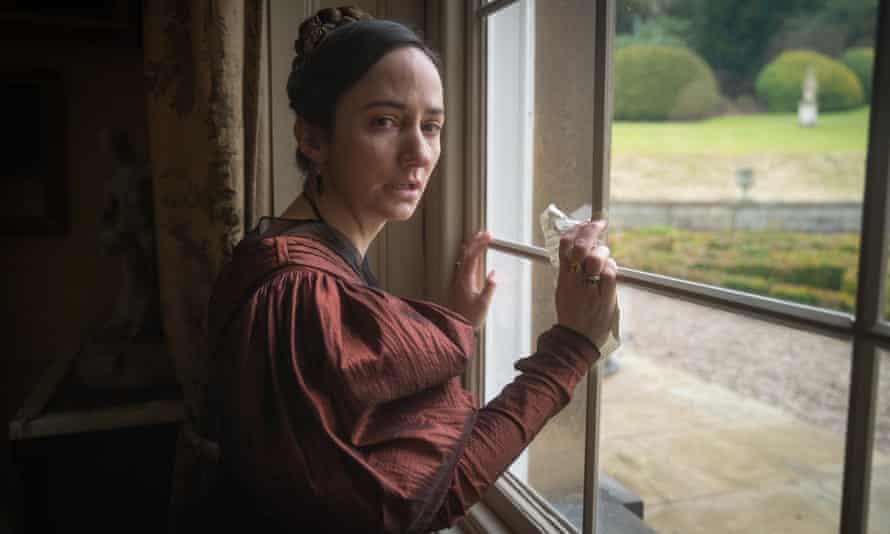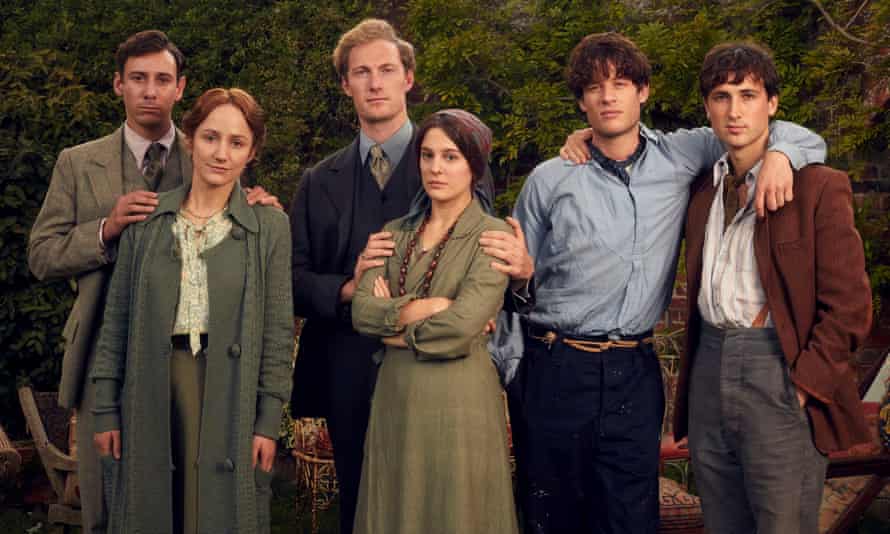[ad_1]
Lydia Leonard may not be a household name, but she has played plenty of them. From her Tony-nominated turn as Anne Boleyn in the West End and Broadway productions of Wolf Hall to a stint as Jackie Onassis on stage and Virginia Woolf on TV – not to mention her forthcoming appearance as Cherie Blair in The Crown – the 40-year-old takes transforming into incredibly famous and impressive women entirely in her stride. But none of them have proved anywhere near as daunting as her latest role.
“It was probably the most nervous I’ve been,” says Leonard, leaning anxiously over a picnic table outside an east London coffee shop. “Well, terrified.” She corrects herself again. “I mean, thrilled.”
Sign up to our Inside Saturday newsletter for an exclusive behind-the-scenes look at the making of the magazine’s biggest features, as well as a curated list of our weekly highlights.
Whether Leonard is in fact nervous, terrified or thrilled – or any combination of the three – it would be completely understandable. She is about to play the lead in the British remake of Call My Agent!, the French comedy series that rocketed to worldwide smash-hit status during the pandemic. The show’s breakout star, Camille Cottin – who plays the cool, acid-tongued talent agent Andréa – graduated from domestic success to global recognition over the course of the show’s four series. In the UK version, renamed Ten Percent, Leonard is playing the Andréa character, Rebecca. She also happens to be one of the French actor’s many devotees – and it is her legacy Leonard is most worried about living up to. “I was really quite in love with Camille Cottin,” she explains.
As besotted as she was with her Parisian counterpart, Leonard knew she must scour all trace of Cottin from her mind, immediately tearing herself away from the original show, “because it’s not helpful if you’re going to be approaching something for yourself”. That was especially important considering the two characters are very much cut from the same cloth: Rebecca and Andréa are both incredibly self-possessed, high-powered women with chaotic love lives and a knack for intimidating junior staff – and quite often the viewer, too. (Very much not cut from the same cloth is Leonard, who is palpably nervous and prone to second-guessing herself: constantly revising answers to even the most innocuous of questions.)
To really make her mark as Rebecca, Leonard looked to her own life for inspiration. Instead of her experiences with agents, she thought back to a collection of “hardcore Soho media women” she befriended through her cousin in the early 00s. “I’d ride on their coattails when I was 24 and they were in their 30s. It was all expenses and boozy lunches.” She even briefly worked for one of them at the time, answering the phone at a media company, and has channelled the swagger she witnessed into her portrayal of Rebecca.
In fact, translating a show that felt quintessentially French (chic, witty but also frequently melodramatic and farcical) into something recognisably British was the mission of the entire Ten Percent team. Wisely, they enlisted John Morton – the writer behind sitcoms Twenty Twelve and W1A, known for their distinctively stilted and jargon-heavy dialogue – to convert the stylish original into a workplace comedy brimming with deadpan cringe. “We’re not as cool as the French, so it’s a bit more bumbling,” is how Leonard sums it up.
The UK has been able to compete on the star power front, however. The French version’s sumptuous cameo list – Juliette Binoche, Monica Bellucci, Isabelle Huppert – has been swapped for a swathe of big British names, including Emma Corrin, Helena Bonham Carter and Dominic West. The core cast is similarly impressive, featuring Jim Broadbent, Jack Davenport and Maggie Steed as three of the other agents.
Yet the initial draw of the show remains the same in both versions: there is something irresistibly meta about seeing actors play agents desperately wrangling, protecting, counselling and often manipulating other actors. And while it makes an agent’s life seem inordinately stressful, it’s the actors you tend to feel most sorry for. The first two episodes of the British version depict acting as head-spinningly precarious and chockful of rejection: one storyline involves old friends Bonham Carter and Olivia Williams both believing they’ve been cast in the same role: a potentially ego-devastating problem for which the agents must find a miraculous solution.

Leonard can certainly relate; she says she never truly believes she actually has a part until she is safely on set. “And even then, you think you’re probably going to get fired for at least the first week – until you’ve got significant stuff in the can that you know it would cost them too much to reshoot without you.”
Less relatable, thinks Leonard, is the plot of the show’s first episode, in which Kelly Macdonald loses a role in a Hollywood blockbuster for looking too old. The storyline is almost a scene-by-scene remake of the French version’s opening episode (the story arcs do diverge later in the series), in which film star Cécile de France is almost persuaded by an agent to get cosmetic surgery in order to secure a part in a Quentin Tarantino movie. Leonard says nothing remotely similar has ever happened to her. “No, no one’s told me personally to get tweaks,” she responds quickly.
Cosmetic surgery is something of a sensitive subject for Leonard – but not for the reasons you might expect. In 2017, she gave an interview to a newspaper in which she spoke about being replaced by Rebecca Hall in the film version of Frost/Nixon. (She played Frost’s partner Caroline Cushing in the original theatre production, and while her co-stars Michael Sheen and Frank Langella were cast in the Hollywood adaptation, she was not.) In the piece, Leonard says she asked to audition for the film role, but her agent wasn’t optimistic about her chances, saying: “No, darling. It’s about bone structure. Now, I’m not going to be the one to tell you to get plastic surgery … ” The article quotes Leonard’s response as: “I thought: well it sounds like you’re telling me to get plastic surgery!”
That, says Leonard, was “bullshit”. Or, more precisely, a joke that didn’t carry in the printed retelling; her agent was not being remotely serious in her suggestion that her client go under the knife. Leonard was “quite upset” about the interview (not surprising, considering she is still with that same agency, and has been since drama school). This is partly why she seems so anxious and un-Rebecca-like today: she says she’s been apprehensive about speaking to journalists ever since that incident. (Prior to our meeting she went for a swim in an attempt to calm herself down.)

Still, is it so outrageous to believe an agent might suggest surgery to their client? It happens in Ten Percent, after all. Leonard thinks that is probably a thing of the past. “Let’s remember Call My Agent! was written pre the last few years,” she says. “You do hear of people being told to lose weight and whatnot, but hopefully [nowadays] that’s pretty off-key for anyone to suggest.” (A couple of weeks later, Leonard requests a telephone call in order to clarify her thoughts on the matter. She has since spoken to her agent about the cosmetic surgery joke, who told her that despite the suggestion not being serious in her case, they “absolutely were encouraged to say things like that to people – so it’s relevant and not like it didn’t happen.”)
Whatever the industry’s precise pressures on women, it is hard to get away from the fact that acting is a profession that may as well be engineered to make people feel as self-conscious as possible. “Part of the job is having to stare at yourself in a mirror for two hours every morning while somebody does your makeup, or watch yourself on a big screen – that’s definitely not good,” agrees Leonard. Her new tactic is to view her performances through her phone, the small, low-quality picture making it harder to analyse the finer details. “There’s enough distance: I can grasp that they’ve told the story well and not fall into that thing of scrutinising yourself too closely.”
Leonard is no stranger to scrutinising herself; she has been doing it her entire life. In fact, it’s part of the reason she wanted to become an actor in the first place. The initial seed was sown, she thinks, by her alliterative name. “Friends’ parents would be like: ‘Lydia Leonard! That sounds like an actor!’” Then there was her obsession with Winona Ryder (“I had a lot of pictures of her on my wall”). Most crucial, however, was the layout of her childhood bedroom at her family’s Hampshire home. “This is a bit psychotic, but I had a really big mirror in the corner of my room and used to have quite a lot of conversations with myself in that – doing faces and voices. Very narcissistic and nuts.” The sort of setup that could easily foster an actorly awareness of how you are coming across.
After an initial rejection – she spent the intervening year backpacking and working in Selfridges – Leonard got a place at Bristol Old Vic theatre school, which has a reputation as a hyperselective hothouse for serious acting talent (past alumni include Daniel Day-Lewis, Olivia Colman, Jeremy Irons and Naomie Harris). It sounds like the opportunity of a lifetime, but Leonard is very reluctant to sing the praises of drama school. “I wouldn’t necessarily advocate it. I don’t think people need to be trained, and a lot of the best actors one works with haven’t been to drama school at all, so I don’t want to glorify it.” Acting, she thinks, is something “you can’t really teach – either you’ve got it or you don’t”.

However little it taught her, drama school did help Leonard get her foot in the door of the industry. After graduating, she slid immediately into a steady stream of theatre and TV jobs. But it wasn’t until her 30s that things got substantially “busier”. After the success of Wolf Hall, meatier television roles followed: Virginia Woolf in the BBC drama Life in Squares, for a start, but also a leading part in Victorian medical comedy Quacks and a recurring role in Gentleman Jack as another real historical figure, Mariana Lawton, the ex-lover of Suranne Jones’s titular protagonist and a major player in the show’s currently airing second series.
Leonard thinks she was always destined for success (marginally) later in life. She never felt she fitted into the role of the “ingenue, even when I was 21 – you grow into your casting”. She is also aware that a changing industry means women are no longer past their sell-by date by the time they reach their fourth decade. “When I first started out I was definitely conscious of people saying you’ve got to have had a break by the time you’re 25 or you could forget about the roles in your 30s and 40s. That’s completely turned on its head now and a lot of the best roles on television are women in their 50s.”
That is partly because 20 years ago the idea of “making it” wasn’t just about being recognised for your skills: success was inextricably linked to being seen as a sex object. “When I was young you hadn’t made it unless you were in your underwear on the front of FHM. That was never my dream but I was a teenager in the 90s, so a bit of you still [internalises] these weird things about what success as a woman is.” It was a situation that continued well into the 2000s, too: Suranne Jones has spoken about how she was pressured into posing for lads’ mags when she started working on Coronation Street.
Now, Leonard is very much cleaving to modern ideas of actorly success. And for British thesps that tends to involve a role in the fascinating and impeccably constructed Netflix epic The Crown. Last year, Leonard was cast as Cherie Blair – alongside Bertie Carvel as Tony – in the show’s fifth and sixth seasons. (There is also a substantial crossover between the cast of The Crown and Ten Percent, with Bonham Carter, Corrin, Williams and West all involved in both shows.)

Leonard had long harboured an ambition to be in The Crown. “It’s funny because over the years from the sidelines as a vaguely posh, white actress, you think: who could I be in The Crown? So-and-so? No, I’m too old. So-and-so? No, I’m too young. It never occurred to me that I could be Cherie Blair, so when I got that call I was quite surprised.” Once hair and makeup had finished with her, though, she was converted. “You’re like: oh my God, I look exactly like her!” You can certainly see why The Crown casting team are regarded as the best in the business: stylishly dressed with long glossy hair, at first glance Leonard doesn’t seem very Cherie-like at all; but once you start looking for similarities, the facial resemblance begins to verge on the uncanny.
When it comes to playing famous women, Leonard quickly realised there is no one-size-fits-all approach. She listened to tapes of Virginia Woolf, but decided against mimicking her voice. “The way they spoke then would be completely distracting for a modern drama now,” she says. “It sounds so ridiculously period.” With Anne Boleyn, she did some independent research, and would occasionally bring a fact she’d unearthed with her to the rehearsal room, feeling “quite pleased” with herself as she did so. But she ultimately realised that this detective work was a bit pointless as Hilary Mantel’s novels were the only material she needed. “You’re not doing the definitive Anne Boleyn, you’re playing Hilary Mantel’s Anne Boleyn – you’re a cog in that story.” Cherie Blair – someone whose voice and mannerisms are relatively familiar to the general public – requires something more akin to an impersonation, says Leonard. “I’ll be trying to do more of a likeness than I would with a historical character; she reads her own audiobook, so that’s helpful.”
Her Cherie won’t reach screens until November, at which point it’s likely that Leonard will have become a much more familiar face thanks to Ten Percent and its built-in audience of Call My Agent! fans. On the one hand, it seems slightly ironic that this chameleonic actor’s breakout moment will be as a character so similar to her real self – a contemporary, successful, rather posh Londoner working in the film and TV industry. And yet, after meeting her, it’s clear that the role requires the same sort of transformation as any other. For the perpetually cautious Leonard, self-assured, swaggering super-agent Rebecca is as much of a stretch as any 1960s first lady or tragic Tudor queen.
Ten Percent is available in full on Amazon Prime Video from 28 April.
[ad_2]
Source link